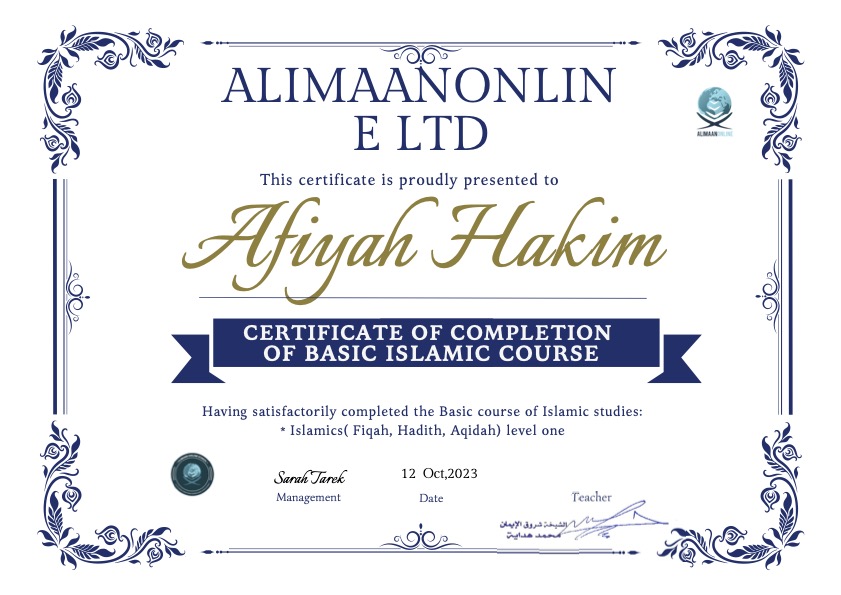In the vast realm of religious education, obtaining an Islamic Studies Certificate is a commendable achievement for those seeking a deeper understanding of the Islamic faith and its traditions. This article will provide you with an insightful overview of Islamic Studies programs, including Fiqh, Aqidah, Hadith, Tafsir, and Seerah, highlighting the significance and scope of each.
Program Overview
Obtaining an Islamic Studies Certificate involves immersing oneself in the multifaceted world of Islamic knowledge. These programs offer a structured pathway to explore various aspects of the Islamic faith, from theological principles to historical narratives. This comprehensive overview will guide you through the key Islamic Studies programs and what they entail.
Islamic Studies Programmes
1-Fiqh Course: Understanding Islamic Jurisprudence
Fiqh, often referred to as Islamic jurisprudence, is a pivotal component of any Islamic Studies program. It delves into the intricate legal framework of Islamic principles and guidelines for daily life. The Fiqh program equips students with the knowledge to interpret and apply Islamic laws, ensuring they understand the religious obligations that govern their actions.
2-Aqidah Course: Exploring Islamic Theology
Aqidah, or Islamic theology, is another fundamental area of study in Islamic Studies programs. This program delves into the core beliefs and principles of the Islamic faith, helping students develop a profound understanding of the creed, Allah’s attributes, and the foundations of Islamic spirituality.
3-Hadith Course: Uncovering the Traditions
The Hadith program is a key element of Islamic Studies, focusing on the sayings and actions of the Prophet Muhammad (peace be upon him). Students learn to critically analyze Hadith literature, authenticate narrations, and understand the context behind each tradition. This knowledge is vital for those seeking to comprehend the Sunnah, the exemplary way of life as taught by the Prophet.
4- Tafsir Course: Interpretation of the Quran
Tafsir, the Quranic exegesis program, delves into the profound meanings and interpretations of the Quran. Additionally, it equips students with the skills to analyze the text, understand its context, and extract the spiritual and legal guidance it provides. Consequently, Tafsir is an essential part of Islamic Studies, fostering a deeper connection with the holy book.
5- Seerah Course: The Life of the Prophet
The Seerah program is a fascinating journey into the life of the Prophet Muhammad (peace be upon him). Additionally, it explores his life, character, and the historical context in which he lived. Understanding the Prophet’s life is crucial for Muslims; consequently, it provides insight into how to emulate his virtues and teachings.
The Significance of an Islamic Studies Certificate
An Islamic Studies Certificate holds immense value in today’s world, whether you are a scholar, a student, or someone eager to deepen their faith. It provides a well-rounded understanding of Islam and its traditions, enabling you to engage more profoundly with the religion and the global Muslim community. Moreover, it opens doors to various opportunities, including teaching, interfaith dialogue, and community leadership roles.
Transitioning from one program to another within an Islamic Studies Certificate course is seamless, ensuring that students gain a comprehensive understanding of the faith. This fluid progression allows individuals to delve into each subject with dedication and a solid foundation.
Disseminating information about these programs is vital for aspiring students; consequently, they can make informed choices aligned with their interests and goals. Moreover, each program caters to a specific aspect of Islamic knowledge, ensuring that students can specialize in their area of passion or pursue a well-rounded education.
Furthermore, the flexible nature of Islamic Studies programs allows students to tailor their curriculum to their needs and schedules, whether they are full-time students or working professionals seeking to expand their horizons.
Conclusion:
In conclusion, obtaining an Islamic Studies Certificate opens doors to a world of knowledge, spiritual growth, and opportunities for personal and professional development. Whether you are a devout Muslim seeking to deepen your faith or a student of religion interested in expanding your horizons, these programs provide a comprehensive and structured approach to Islamic knowledge, ensuring a well-rounded education. Consider embarking on this enriching journey to gain a deeper understanding of Islam’s rich traditions and principles.

